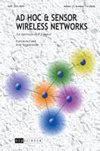A Support Vector Machine Implementation for Traffic Assignment Problem
IF 0.6
4区 计算机科学
Q4 COMPUTER SCIENCE, INFORMATION SYSTEMS
引用次数: 0
Abstract
Simulating urban mobility scenarios is a useful tool for researchers in multiple fields like Urban Planning, Traffic Optimization, CO$^2$ Emissions Analysis, Performance Evaluation of Protocols for Connected Vehicles, among others. SUMO handles microscopic traffic simulations and allows communication to Python language through an API which is also shared by VEINS. This communication channel lets researchers interact with the simulation on-live, facilitating the implementation of state-of-the-art algorithms from Machine Learning (ML) and Artificial Intelligence (AI). On the other hand, OMNeT++ is a framework to manage and analyze communication protocols of mobile networks. We experimentally evaluated the training of a Support Vector Machine (SVM) in the SUMO-VEINS-OMNeT++ framework. Our experiments show the best classification model for a particular traffic light assignment scenario.交通分配问题的支持向量机实现
对于城市规划、交通优化、CO$^2$排放分析、互联汽车协议性能评估等多个领域的研究人员来说,模拟城市移动场景是一个有用的工具。SUMO处理微观交通模拟,并允许通过API与Python语言通信,该API也由vein共享。该通信通道使研究人员能够与现场模拟进行交互,促进了机器学习(ML)和人工智能(AI)最先进算法的实现。另一方面,omnet++是一个管理和分析移动网络通信协议的框架。我们实验评估了支持向量机(SVM)在sumo - vens - omnet++框架下的训练。我们的实验显示了一个特定的红绿灯分配场景的最佳分类模型。
本文章由计算机程序翻译,如有差异,请以英文原文为准。
求助全文
约1分钟内获得全文
求助全文
来源期刊

Ad Hoc & Sensor Wireless Networks
工程技术-电信学
CiteScore
2.00
自引率
44.40%
发文量
0
审稿时长
8 months
期刊介绍:
Ad Hoc & Sensor Wireless Networks seeks to provide an opportunity for researchers from computer science, engineering and mathematical backgrounds to disseminate and exchange knowledge in the rapidly emerging field of ad hoc and sensor wireless networks. It will comprehensively cover physical, data-link, network and transport layers, as well as application, security, simulation and power management issues in sensor, local area, satellite, vehicular, personal, and mobile ad hoc networks.
 求助内容:
求助内容: 应助结果提醒方式:
应助结果提醒方式:


